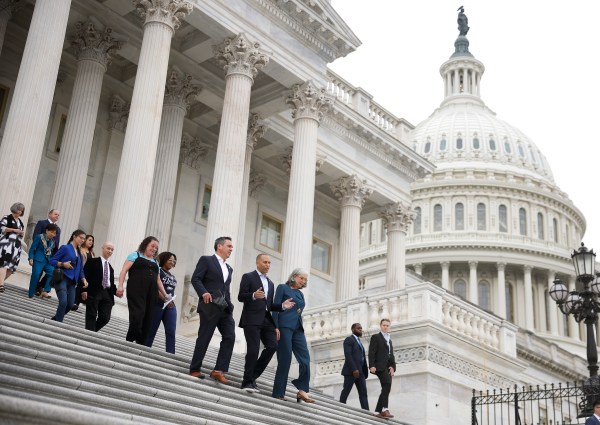President Joe Biden released his 2025 fiscal year budget proposal on March 11. The budget proposal, which seeks to increase tax rates on both corporations and the wealthiest Americans, would raise the top marginal income tax for individuals to 39.6 percent and tax capital gains above $1 million at that same rate. A similar increase in the net investment income tax—an additional tax levied on income from sources including capital gains, dividends, and rental income—would increase the maximum capital gains rate to as high as 44.6 percent for certain high-income individuals.
“Biden is proposing a 44.6% capital gains tax, the highest ever, previously set by Jimmy Carter,” says a post that has gone viral with more than 814,000 views on X (formerly Twitter). “Here’s how that worked out for Jimmy Carter.” The post has also spread to Facebook, earning 4,600 likes and more than 1,000 shares on the platform.
The post, however, is incorrect: President Carter did not set the highest capital gains tax rate in U.S. history—he actually signed legislation cutting the effective rates set by his Republican predecessors. Additionally, while it’s impossible to place the blame for Carter’s reelection defeat on any single issue, historians of the period do not typically consider Carter’s tax policy to have been a significant factor.
A brief history of capital gains taxation.
Throughout most of American history, capital gains taxes—meaning taxes applied to profits made from the sale of appreciated assets, such as stocks or bonds—were low or nonexistent. Capital gains were only considered income beginning in 1913 following the ratification of the 16th Amendment, and they were initially taxed at ordinary income tax rates. The maximum income tax rate increased from 7 percent to 67 percent in 1917 after the U.S. entered World War I, and rates eventually reached a high of 77 percent in 1918, resulting in the highest maximum capital gains tax on record until preferential capital gains rates were introduced in 1921 that decreased the burden.
Maximum long-term capital gains rates stood at around 25 percent after World War II, but rates began to rise following passage of the Tax Reform Act of 1969. The law, signed by Republican President Richard Nixon, steadily increased maximum rates on all capital gains above $50,000 from 29.5 percent in 1969 to 35 percent in 1972. The act also raised the tax rate on gains below $50,000 from 25 percent to an eventual 30 percent. A second Tax Reform Act was signed into law by Republican President Gerald Ford in 1976 that raised minimum capital gains tax levels and increased the holding period necessary to qualify a gain as “long-term” from six months to one year. These revisions increased the capital gains tax rate to 39.88 percent, according to research by the Tax Policy Center, rising to a maximum effective rate of 49 percent.
Carter actually cut effective rates once he took office. In the 1978 Revenue Act—signed by Carter on November 6, 1978—the effective maximum capital gains tax was reduced from 49 percent to 28 percent through an increase in the long-term capital gains deduction. When Carter took office, individuals paid capital gains taxes on only 50 percent of their net long-term capital gains. Under Carter’s 1978 revenue bill, however, taxpayers were required to pay taxes on only 40 percent of these same net gains, resulting in a lower effective tax rate on their capital gains overall.
Biden’s 2025 budget proposal would raise capital gains taxes on wealthy Americans by taxing capital gains income above $1 million at ordinary income tax rates instead of at the 20 percent maximum capital gains rate applied today. The proposal also raises the top individual income tax rate from 37 to 39.6 percent, meaning any capital gains above $1 million would be subject to that new maximum rate. The net investment income tax would similarly be increased from 3.8 percent to 5 percent for income above $400,000, resulting in a maximum effective capital gains rate on high earners to 44.6 percent.
Why did Carter lose?
Ronald Reagan defeated Carter by an overwhelming margin in the 1980 election. Carter won only six states plus the District of Columbia, and lost the Electoral College 489-89. Carter’s tax policy—and particularly his revisions to capital gains tax rates—is not considered by most historians to be one of the reasons he lost.
“No, it’s not right at all,” Terry Anderson, a professor of modern U.S. history at Texas A&M University, told The Dispatch Fact Check when asked whether Carter’s tax policy contributed to his election loss. “The things that did come up, as far as the economy in the 1980 election were inflation and the imbalanced budget. People were starting to get worried about that, and they actually believed that Reagan could bring about a change in the budget with his idea of supply side economics.” Instead, Anderson argues that the second half of Carter’s presidency was ruined by factors including inflation, the Three Mile Island nuclear accident, 1980 Moscow Olympics boycotts, and the Iran hostage crisis. “For all of those reasons, he gets hammered in 1980. No one cared about tax rates, that didn't come up during the election at all.”
If you have a claim you would like to see us fact check, please send us an email at factcheck@thedispatch.com. If you would like to suggest a correction to this piece or any other Dispatch article, please email corrections@thedispatch.com.







Please note that we at The Dispatch hold ourselves, our work, and our commenters to a higher standard than other places on the internet. We welcome comments that foster genuine debate or discussion—including comments critical of us or our work—but responses that include ad hominem attacks on fellow Dispatch members or are intended to stoke fear and anger may be moderated.
With your membership, you only have the ability to comment on The Morning Dispatch articles. Consider upgrading to join the conversation everywhere.